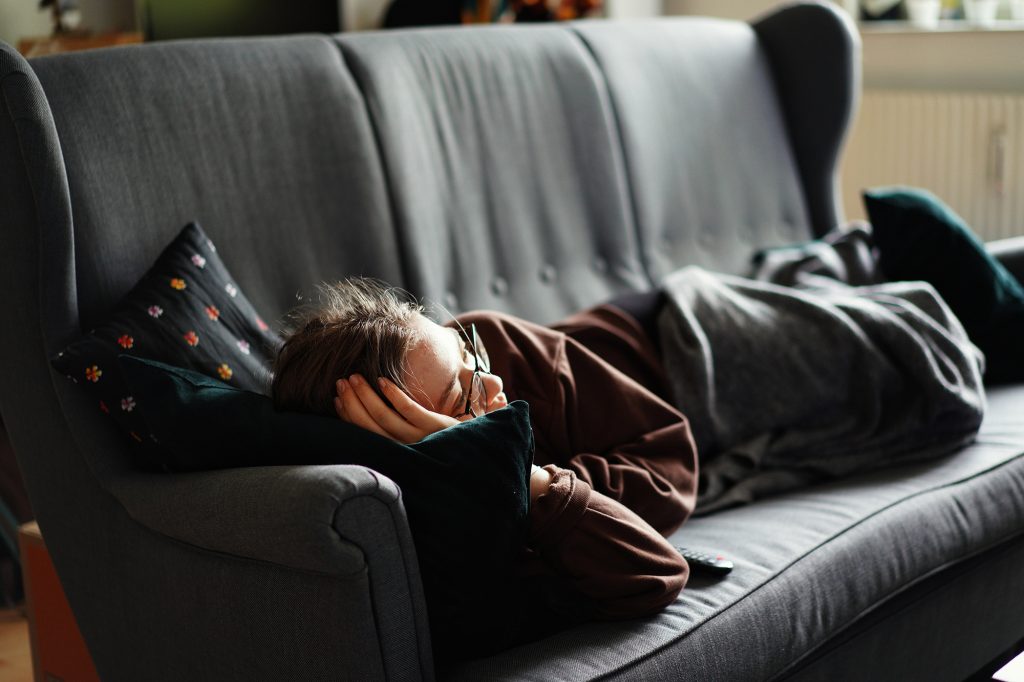
Sleep
We all need sleep to be well. If you do not get enough sleep, your mind works slower, focusing is difficult, and it becomes harder to remember and learn things. When continuing for a long time, insomnia or tiredness may lead to anxiety or even depression.
If you have suffered from insomnia for a longer time, you cannot catch up on sleep with a few good nights. That is why you should ensure that you have sufficient time for sleep every day. Young people need 8 to 9 hours of sleep per night, on average. Adults are fine with 7 to 9 hours of sleep.
Please contact a medical professional if you suffer from insomnia several nights a week, it has lasted over two weeks, or if it makes you feel tired and listless during the day. You can find links to care services in the upper right sidebar.
If waking up in the morning feels difficult even if you went to bed early, your tiredness may be related to sleep cycles. If you woke up at the wrong time in your sleep cycle, during the deep sleep phase, you will probably be more tired than if you woke up at the end of the cycle, the REM phase. One sleep cycle lasts about 90 minutes. For example, if you go to bed at 22:00 and it takes you about 20 minutes to fall sleep, the best wake-up times in terms of sleep cycles would be 6:35 or 7:20. You can read more about sleep cycles in the ‘Sleep Factory’ of Mieli ry (in Finnish).

Your brain processes the events of the day during sleep
Sleep has a significant effect on the brain’s functions. For example, the brain processes the stimuli detected during the day while you sleep. When you sleep, some of the memory traces – the things and feelings you have experienced during the day – are stored into long-term memory, and others are forgotten. The latter traces are deleted from the system, in a way.
Sleep also has a broader impact on a person’s functional capacity: it affects the ability to process and regulate emotions and concentrate, for example. The effects of sleep deprivation are much broader than what you might think, and lack of sleep should not be taken lightly. You can read more about the effects of sleep in the ‘Sleep Factory’ of Mieli ry (in Finnish).
Sleep hygiene helps you fall and stay asleep
You can improve your sleep quality by taking care of sleep hygiene. ‘Sleep hygiene’ refers to the things you should do to better fall asleep and stay asleep during the night.
With these tips, you can improve your sleep quality:
- Air the bedroom every morning and evening. Airing the room in the morning helps remove the moisture and carbon dioxide that accumulate there when you breathe. In the evening, airing the room lowers the room temperature and increases the oxygen content, which helps you fall asleep.
- Make your bed after breakfast. This way, the moisture gathered in the bedclothes has time to disperse, and your bed will be dry in the evening.
- Use the nighttime settings on your phone and other devices. With the nighttime settings, you can turn of all notifications, make the screen darker and reduce blue light. Set the nighttime settings to turn on automatically a few hours before your bedtime, and turn off automatically shortly before wake-up time.
- Refuse blue light. The blue light from smart devices activates the brain and makes it harder for you to fall asleep. Stop using your phone or computer a few hours before bedtime. If you cannot stop using the devices altogether in the evening, turn on the settings that reduce blue light.
- Always wake up at the same time. By waking up at approximately the same time every day, maintaining the balance between your sleeping rhythm and energy will be easier. When you stick to a specific sleep schedule, you will probably feel tired at the right time in the evening.
- Change your sheets and take care of your bedclothes. Clean bedclothes make you want to go to bed early and help you fall and stay asleep. Change your pillowcase, sheets and duvet cover with clean ones every week or every few weeks. Also remember to wash your pillow, duvet and mattress cover a few times a year, or take them to a laundry service. They collect a lot of dust, sweat and other dirt. Bedclothes are not forever. You should replace your pillow every few years; a duvet and mattress cover will last a few years longer.
